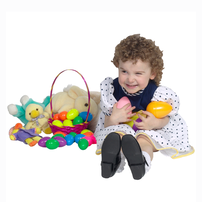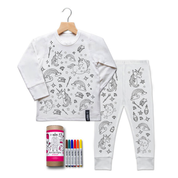 As a kid, there is nothing more exciting about Easter than the idea of the Easter bunny hopping to your house and delivering a basket filled with candy and toys! But while lots of their excitement may surround chocolate bunnies and cream eggs, there are children who either can't tolerate most candies, or parents and caregivers who would rather they not load up on sugar. The good news is, there are so many sensory toys and activities you can add to their Easter baskets this year! Here are some ideas that are great for creating basket themes or just to combine different kinds of fun together:
https://www.wonderbaby.org/articles/multi-sensory-easter-basket-ideas https://www.fantasticfunandlearning.com/gardening-sensory-bins.html https://sanantonio.kidsoutandabout.com/content/80-easter-basket-ideas-arent-eggs-or-candy
1 Comment
 With the holidays just around the corner, the excitement of Santa Claus grows as each day passes. With joy in the air comes an unspoken stress to get the perfect gifts to surprise your loved ones. This year, the options for kids are endless with the amount of fun, sensory-friendly toys available online, so shopping can be stress-free and safe. There are quite a few things to consider to ensure a gift will be enjoyable and appropriate for a child with special needs. Things to consider when buying presents for a child with special needs 1. Focus on developmental-appropriateness. Taking into consideration a child’s current level of development, it might be helpful to buy toys that help them practice skills and avoid gifts that are too challenging for their current level and abilities. For example, the interactive game Headbanz may not be a good gift for a child that is non-verbal because it relies on having high level communication skills. Instead, an art and drawing craft or kit could better allow them to express themselves. While many toys give age suggestions, each child has different levels that they prefer or are ready to play without feeling frustrated. 2. Focus on preferences and interests. If a child likes swimming or animal toys, water tables will be a great sensory toy to help them grow. There are also sound puzzles that have a wide array of different animals, including farm and jungle. Ask family or loved ones about what the child likes or dislikes. You can even help expand their interests by taking their like and getting them something similar but a bit different than they are usually used to. For example, if a child likes the feel of sand, you could branch out their interests with a transition to playdough. Some children with autism have limited interests, so getting them something similar, but still new and exciting could help expand their fun. For older, higher-functioning kids, there are products available for just about every interest and hobby imaginable. For example, if the child is obsessed with trains, perhaps an encyclopedia about model trains or a calendar showcasing different images of trains. If they like history, there are several "On This Day"-type calendars to help feed their interests and growing minds. 3. Be mindful of behavioral habits and triggers. If a child is sound sensitive, you won’t want to get a gift with a siren or loud animal noises. If a child is working on their fine motor skills, a sensory swing or a Mr. Potato Head would be a toy they can enjoy and progress with. Here are a few examples of sensory safe and fun gifts that will make younger kids smile with excitement during the holidays! 1. Sand Play Set- Sand is a great way for kids to work on fine motor skills and hand eye coordination, while exploring their imagination! Sand play sets are easily movable for both indoor and outdoor use. 2. Playon Crayons- An easy and comfortable way to allow a child to color and express themselves if they have difficulty holding a crayon. These are made to fit right into a child’s hand and come in so many colors. 3. Ball Pit- This gift is perfect for both indoor and outdoor use. Among the pandemic, it is hard to go to indoor playgrounds where kids love jumping into the ball pit. But this is a great way to bring the fun home. Ball pits are great sensory activities for kids and the plastic balls are a great addition to throw into the bathtub or an inflatable pool too! 4. Sensory Swing- These swings are especially made for kids who have Sensory Processing Disorder, Asperger's Syndrome, ADHD, or those on the autism spectrum. They are therapeutic and help kids with balance, body awareness and motor planning. Kids can relax while laying or bounce, swing, and spin around, whichever mood they are in! 5. Color-In Pajama Set: An art project that will have your child coloring for hours and comfy pajama set all in one! Not only will this be a fun thing for your child to do but they can show off their art with pride around the house when they are getting ready for bed. 6. Fidgets Fidgets can help some kids with ADHD focus better. They’re not “one size fits all,” however. Different types of fidgets can meet different sensory needs. You can see which work best for your child , and then talk to the teacher about using them in class. Children with autism may find using fidget tools soothing and calming as the tools helps them meet their sensory needs. For children with ADHD, the tools can offer a movement outlet that allows the child to focus and concentrate better. Some people with anxiety also benefit from using fidget tools. It's always a good idea to hold on to receipts when gifting any child during the holidays, in the event the gift isn't suitable or if it is a duplicate. For more ideas on what to give the special children in your life, reach out to a professional at Kinera for some helpful ideas. Our team of consisting of both parent navigators and clinical providers can offer insight into the latest and greatest items for children of all abilities. |
AuthorWrite something about yourself. No need to be fancy, just an overview. Archives
June 2022
Categories
All
|
|
Kinera Foundation
115 Sallitt Dr., Suite C Stevensville, MD 21666 (Chesapeake Bay Business Park) Phone: 443-249-3126 Fax: 443-458-0446 Kinera Foundation is a 501(c)(3) Nonprofit organization |
|
Copyright © 2024
Kinera Foundation, Inc. All rights reserved |
|
|
|
